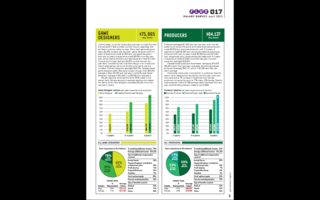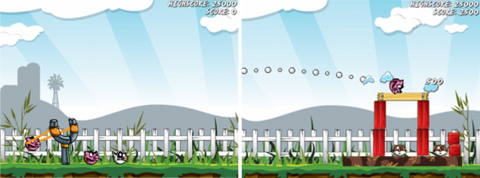The Fullest Ocean
By emofratparty 0 Comments
(Originally published on Retora Games' blog on October 18th, 2013 and was edited on November 14th, 2013. Read it here.)
As of today, there are nearly 900,000 apps on both the App Store and Android Marketplace, with somewhere around a thousand new applications being submitted on a daily basis. Unity has over 2,000,000 registered developers, with 400,000 of them being active each month. That’s not to include all of the Unreal developers, Flash developers, CryTek developers, developers using proprietary tech…the list goes on and on.
Let the following views for the rest of this piece not indicate that of all Retora members, beginning with this one:
Those numbers are [d]ucking scary.
It’s bad enough being a small fish in a big pond, but it becomes increasingly difficult when you are one of x^nth fish and the sea is full of others just like you. Everyone is swimming towards the same goal, but it’s all you can do to stay afloat. And damn, does that goal look like it will take a lot of distance to cover.

That’s not to say there isn’t success — that much is apparent; you’ll see fly-by-night developers rake in millions of dollars overnight and, yes, sometimes even the good guys prevail. But the life we choose — one of solitude, hard work, constant stress, depression, anger, the constant churn of people trying to climb “the ladder”, and sometimes even betrayal — can be difficult to sustain, both physically and mentally.
Working at Retora is great and I have a blast doing so. Despite the negatives attributed to the industry, you can also find: fun, elation, loyalty, good friends, family…maybe even success and happiness (not that the two are mutually tied together)! From a financial perspective, however, independent game development can be a difficult life to lead. That’s not to say people with jobs that are less engaging than mine don’t have a hard time, but the perspective of developers is still not that well understood. A lot of people simply don’t follow the line of work we are in.
The three below images are from this past year’s Gamasutra Developer Salary Survey. They’ll provide a little more context to this discussion.



To quickly summarize the relevance of the above images, working in games is much like any other creative industry. It is possible to find work and, more importantly, stability in a lot of places. But like those other industries, it is an incredibly competitive place. There still exists a dichotomy between larger and smaller creative minds. I’m not a big fan of the word “indie,” but even within that realm there are divisions of like-minded individuals.
A quick breakdown of some (of many) types of developers that I’ve observed over the last few years:
Hobbyists – Men and women who work in other professions but spend part or all of their spare time working on video games, be it for fun or extra income.
The Starving Artist – I really don’t like the word “hipsters,” but sometimes you just have to call ‘em like you see ‘em. These devs are generally those who will vehemently deny “the man,” show little or no respect for larger developers as a whole but respect their individual members and components, and almost exclusively develop experimental games. Again, these are the character traits that I’ve seen belonging to numerous members of the industry, both local and national.
Profit Hunters – Fine ladies and gentleman who see games as dollar signs and nothing else. From my brief experience, most of these types usually work in creative at some point in their careers or jump into games from another industry. Profit Hunters are content with the practice so commonly known as “re-skinning,” flooding app markets on rapid development cycles that are usually not beneficial for the devs, the consumer, and the competition. Many re-skins make money by cashing on the success of whatever titles they are trying to emulate.

Poor Richard – Developers that genuinely do great work, put their heart and soul into everything they make, and end up broken down, poor, and usually stressed far beyond their breaking points.
Indies with Families – This archetype is the one that blows my mind. Some of my good friends in the industry have families and generally live from contract to contract, generally without the time or means to work on their own games, and sometimes as the main provider of food for the table. I respect every one of these people with as much as I have to give.
The Happy Medium – Those in the industry that have found a good balance of working their job, staying happy, and earning a decent, good, or even great living. These developers usually maintain stable and postive relationships and find that, despite any problems in the industry, everything will work out in the end. The most likely of developer types to work in the industry for a long time and enjoy a large portion of it.
Everyone Else - Admittedly, this is a bit broad. But as I stated earlier, there are a ton of other makeups to be found through the people working in games. It’s incredible to see the success and struggles and the different kinds of people that experience each side of the coin.
If you try to relate those character types to the numbers found in the survey, you can find individual quotes and stories further exemplifying what success means to certain people, and how developers get along in the industry depending on where they are.
Now, that all being said – this industry is not something for the faint of heart. In fact, there are plenty of people in games who decide they’d rather not put up with it and move on from games altogether. In another couple of years, I wouldn’t be surprised if the “burnout rate” starts to crawl under five years. I don’t have solid numbers, and for all of Gamasutra’s efforts I don’t believe they have the numbers either, but the stories behind those devs that decide to move on are very, very real.
The industry continues to grow, but growth does not always include everyone. There are a myriad of developers who are unable to achieve their goals in this line of work.
So…why even try this at all? Why do what we are doing? Even if the products we put out are good (and hopefully great, of course), who’s to say that they will do well? Success is measured in a number of ways depending on the person, but financial success is still the leading cause of keeping the lights on. Achieving all variants of success is something quite special.

I love that I am able to make games for a living. I hope that everyone doing this kind of work, regardless of their personal situation, can say the same thing. But am I in love with that living at this moment? It’s hard to say.
As Hank Hill wisely once said…

Sources for dem’ numbers at the beginning: Unity, Apple/Google, Android
Images (in respective order): National Geographic, Game Developer Magazine, n4bb, VG247, and MemeGenerator
